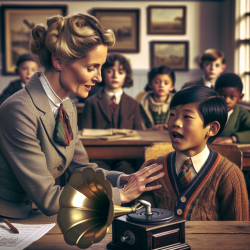Introduction
The rich tapestry of speech therapy, elocution, and speech training in mid-twentieth-century Britain provides a fascinating backdrop for contemporary practitioners seeking to enhance their skills. The research article, "The Art of Speech: Elocution, Speech Training, Speech Therapy, and the Performative Limits of Class in Mid-twentieth-century Britain," offers profound insights into the historical dynamics of these professions and their interplay with class structures. By examining these historical contexts, modern speech therapists can gain valuable perspectives to inform their practice.
Historical Context and Class Dynamics
The article highlights how elocution, speech training, and speech therapy were intertwined with the shifting politics of class in Britain. Elocution, inherited from the nineteenth century, was characterized by vocal and performative practices, often seen as a marker of cultural capital. However, the mid-twentieth century saw a shift towards speech training and therapy, which attempted to distinguish themselves from elocution by focusing on medical and anatomical discourses.
This historical shift provides a lens through which practitioners can understand the performative dimensions of class identities and the complexities of voice professions. The article argues that these professions were not merely parallel developments but were mutually implicated, offering a framework to explore class dynamics and the performative aspects of voice.
Implications for Modern Practice
Understanding the historical context of speech therapy and its relationship with class dynamics can enhance modern practice in several ways:
- Awareness of Class Dynamics: Practitioners can develop a deeper awareness of how class perceptions influence speech therapy. This understanding can guide therapists in creating more inclusive and culturally sensitive interventions.
- Incorporating Historical Insights: By acknowledging the historical roots of speech therapy, practitioners can appreciate the evolution of their profession and its ongoing challenges. This perspective can inspire innovative approaches to therapy that consider both historical and contemporary influences.
- Promoting Inclusivity: The historical disavowal of class in speech therapy highlights the importance of promoting inclusivity and diversity in modern practice. Therapists can strive to create environments where clients feel valued and understood, regardless of their socio-economic backgrounds.
Encouraging Further Research
The article encourages practitioners to engage in further research to deepen their understanding of the historical and cultural contexts of speech therapy. By exploring the intersections of voice, class, and identity, therapists can gain new insights into the complexities of their profession and enhance their ability to support diverse clients effectively.
Conclusion
The historical exploration of elocution, speech training, and speech therapy in mid-twentieth-century Britain offers valuable lessons for modern practitioners. By embracing the insights from this research, speech therapists can enhance their practice, promote inclusivity, and contribute to the ongoing evolution of their profession. To read the original research paper, please follow this link: The Art of Speech: Elocution, Speech Training, Speech Therapy, and the Performative Limits of Class in Mid-twentieth-century Britain.










